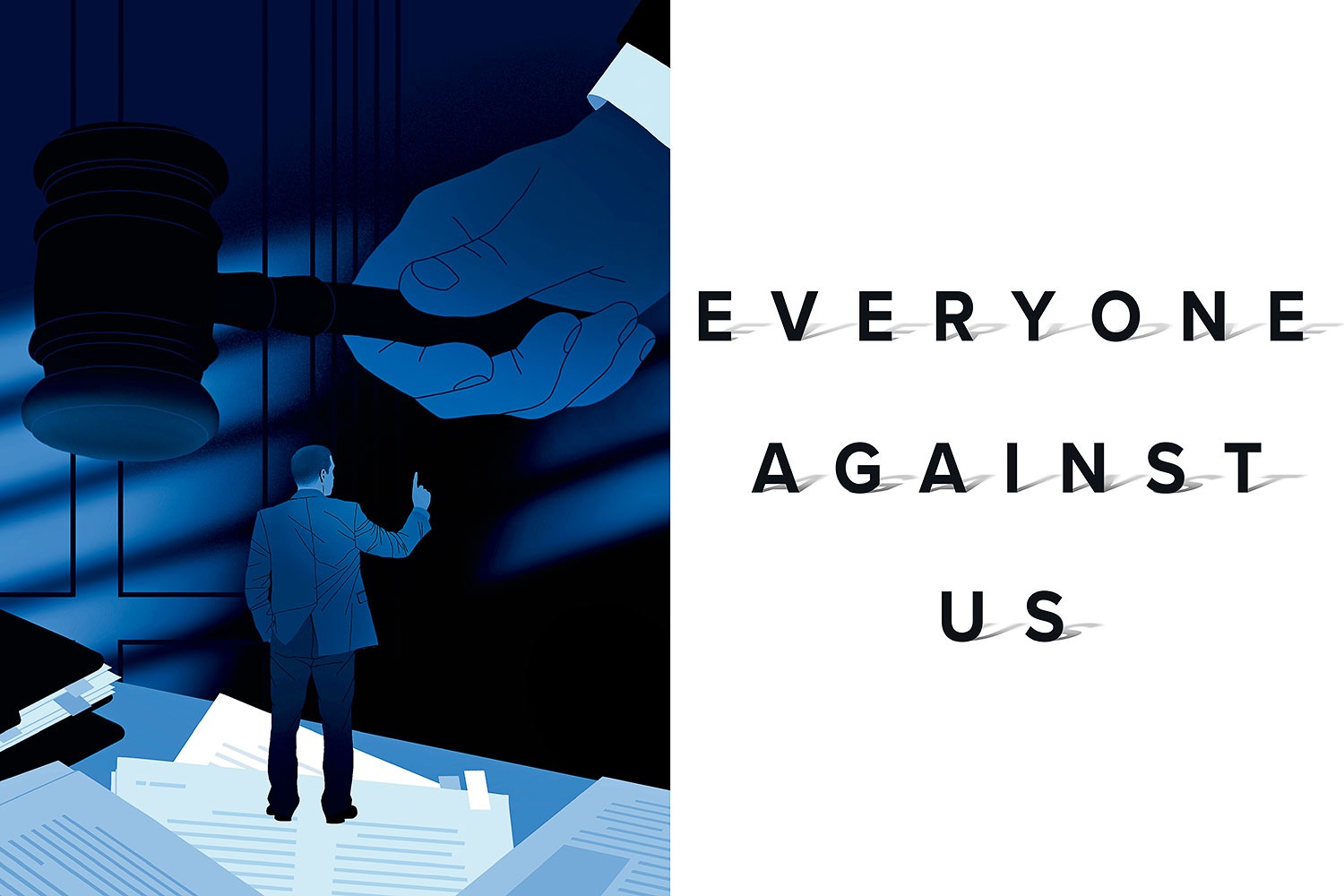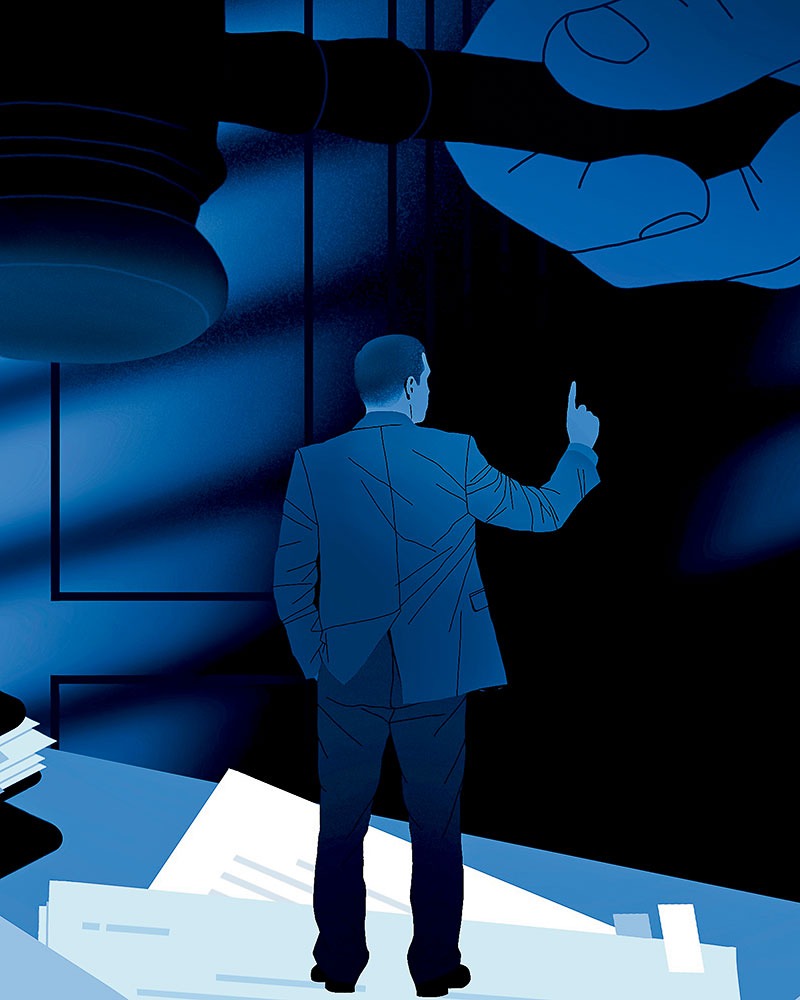Allen Goodman saw it all during his years as a public defender. In Everyone Against Us: Public Defenders and the Making of American Justice, the lawyer describes a system stacked against not only the accused but also the attorneys who represent them. From 1996 to 2004, he worked in the Cook County public defender’s office, primarily in Skokie, where he handled criminal cases from Chicago’s North and West Sides. He later joined a private firm and then opened his own practice. Though Goodman (who practiced law as Allen Gutterman, using the surname of his adoptive parents) left Chicago more than a decade ago and now lives in Israel, the flawed legal system he portrays feels as familiar as ever.
Chris Rock once had a riff about injustice in America that included a punch line about the charade of police reading detainees the Miranda warnings. He suggested how the proper wording should go: If you can’t afford to hire an attorney, then the government will happily provide you with the worst lawyer on earth. It stung.
The reason it stung was because it was as true as a generalization can be, which is to say it wasn’t factually accurate but it centered on an element of common experience. We had many lawyers in the public defender’s office who were not interested in reading constant legal updates, who were not invested in delving into intricate details about procedures or even case facts. We had plenty who were there because it’s where the flotsam of lawyers washes up.
Being a public defender may be unrewarding in terms of both pay and respect, but it is a noble calling. Protection of the accused isn’t charity. It’s necessary because of the possibility of mistakes, farcical legal processes, and the weaponization of false accusations. For public defenders, it’s a special badge of American pride to work for the government and against the government at the same time. We work to try to counteract state abuses; that’s our contribution.
It’s typically more than a month after an arrest before your first meeting with a client. The practical effect is that the defendant has been in the Cook County Jail for an extended stretch. It’s a sprawling place rife with gang pressures, sadistic violence, punitive procedures, retrenched health care, sordid food, constant noise and stench, systemic sleep deprivation from the constant glare of fluorescent lights, and all the other attendant features of urban incarceration. This is why the bond system is a form of blackmail. Believe me, most people who serve time in the Cook County Jail are ready to do whatever it takes to get out. They will take pleas, forgo investigations, agree to draconian probationary conditions, waive procedural rights, even acquiesce to prison sentences just to “get out of county.”
Sometimes the first meeting with a client is oddly rote and perfunctory, like when the defendant is a frequent flier who wants to plead out a simple case. There is a vast underclass of people who seem accustomed to being arrested, and both they and many courthouse apparatchiks become numb to the revolving door and inevitability of being in the system. Allegations of racism and classism gain a lot of traction in this situation, especially when you see who comes through the door and the mechanized way they are processed for what the staff calls “disposal.”
Other times the clients are people who have never been arrested before, who have no idea what they’re being charged with, even after a month in jail, or who have been charged with extremely serious offenses. They can be scared, ashamed, angry, hurt. They are entering the worst experience of their lives — maybe the defining experience of their lives — and their PD might be the first somewhat friendly person they can talk to for help. Even so, to them you represent “the system.” We try to establish trust by being part psychologist, part medic, part cleric.
The most intense pressure that ate at me as a criminal defense attorney came from the split in reality that occurred depending on whether I won or lost a trial. It strains every boundary of expression to attempt to describe the difference between incarceration and freedom, and it defies all reason to consider just how thin the line can be. Especially if I thought I should win, defeat was devastating. Crying on the floor of the lockup is not a good look for any lawyer, but I’ve been there, and I can promise you I’m not alone.
Most cases simply never get to any kind of hearing or trial due to plea agreements. Among the cases that do, there is an old unwritten rule floating around Cook County defense practitioners: Take winners to a bench, take losers to a jury. “Heaters” — cases with intense public pressure — usually have to go to juries. And there are times when judges will tell the defense attorney, either point-blank or via hints, that he or she will not get a good outcome from them and should not try a bench trial.
The inverse is known as a “jury tax.” I’ve also heard it referred to as the “asshole penalty.” Judges have been known to sentence defendants more harshly after a jury loss than they would have if the defendant pleaded guilty.
Public defenders don’t get the limitless resources and an international array of specialist agencies like the prosecution does. In the public defender’s office, most of us work with a single investigator who is shared with other attorneys.
My right-hand man was a guy from the Far South Side who had extensive experience on both sides of the law. Unfortunately, he did not actually have a complete right hand. Ralph lost four fingers — but not his thumb — in an industrial accident in the 1970s when he worked at the Sun-Times printing plant. Surgeries that initially sewed his hand to his stomach to regenerate his skin had left him with a stump of doughy folds pulled over and sealed shut. The irregular hairs and patchy circulation gave the whole thing a look somewhat like a large, dry, gelatinous turkey drumstick with a single opposable digit. He took great joy in thrusting that thing out at introductions, offering what he could as his form of handshake.
For a very high portion of PD investigations, it’s absolutely critical to just go check. Check the details of the narrative that the police have laid out, and check what the defendant tells you. Go to the scene and observe the physical layout to view sightlines, lighting, cameras, distances, and see what else isn’t in the reports. People might be surprised to learn just how often the defense finds some evidence to suggest that the police “clean up” their cases with exaggerations, simplifications, convenient omissions, and outright lies.
It strains every boundary of expression to attempt to describe the difference between incarceration and freedom, and it defies all reason to consider just how thin the line can be. Especially if I thought I should win, defeat was devastating.
In 1997, Ralph and I needed to visit the scene of an arrest in the Cabrini-Green public housing project for a client. It was a drug case of a somewhat serious variety — possession of a controlled substance with intent to deliver, or “PCS w/I” — that involved a substantial amount of cocaine. The defendant was looking at serious time, and since he was accused of dealing out of a Chicago Housing Authority apartment, his family faced being evicted too.
As a way around the constitutional requirement that they get warrants to search houses, the police were claiming that they were simply walking down the hallway when they looked in the window of our client’s apartment and saw him weighing and packaging cocaine in plain view. They also claimed that he was doing this with his apartment door open, so they hadn’t needed a forced entry.
Our client went by the street name “Deuce.” He didn’t deny he was packaging cocaine at his kitchen table, but he insisted that he was not doing it brazenly in the open; that not only had he covered his windows with taped-up sheets and garbage bags, but he had closed and locked his door, as you might expect for someone engaged in illegal activities.
We went to the CHA management offices, where they had records of giving Deuce citations for repeatedly covering up windows. We also talked to the maintenance man who had been assigned to repair Deuce’s door after his arrest. The maintenance crew had taken pictures that clearly showed damage to the doorjamb, backing up Deuce’s claim that the door had been kicked in.
We proved that the search and arrest were done in violation of the Constitution, and so the evidence collected during the arrest could not be used at trial. The charges had to be dropped.
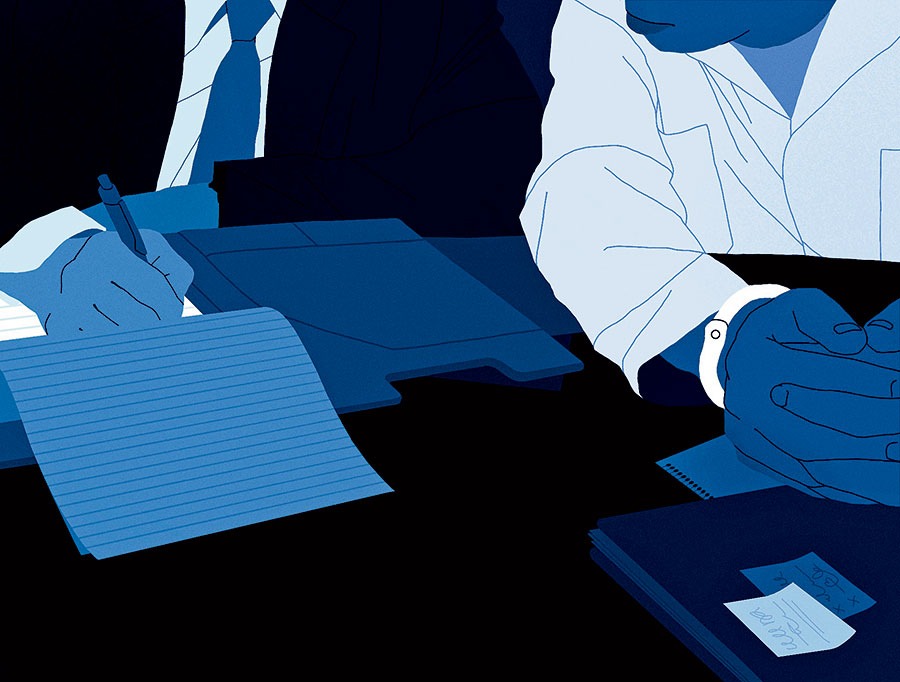
When it comes to plea deals, the holy grail is to keep a clean record for your client by getting the charges dropped in exchange for something nonjudicial like an apology, restitution, classes, or some offsetting charity act. If that’s out of reach, the next best thing is to avoid a felony conviction by getting those charges reduced to a misdemeanor.
For many years illegal gun possession in Illinois was a misdemeanor. As gun crimes began to escalate and garner more media and political attention, new felony enhancements were created. When those didn’t end the violence plaguing Chicago, a new strategy was devised: an unwritten policy in the state’s attorney’s office to forbid any plea deals that reduced felonies to misdemeanors, a practice previously used in cases deemed worthy of discretionary mercy.
Charges for gun possession in Chicago are labeled as “unlawful use of a weapon,” or UUWs. Just after this unwritten policy took effect, I had a UUW client who was a 20-year-old Black kid from the Southwest Side. He’d never been in trouble before and was not in a gang. He had a grandmother who lived on the North Side, more than an hour’s ride on the CTA. She was very ill and had a doctor’s appointment that she could not get to by herself, so my client took the bus to her house in order to take her the next morning.
Grandma lived in a gang-infested neighborhood. And when the kid got off the bus, he was immediately confronted by a small group of bangers demanding to know his affiliation: “Rep yo set!” It was about four blocks from the bus stop to his grandmother’s house, and although he tried to ignore the bangers at first and then denied any gang ties when that didn’t work, they followed him, shouting threats.
One of them had a pit bull and unleashed it. The animal clenched onto the kid’s arm, dragging him to the ground. As he kicked and screamed in pain, he was bitten on the arm, hand, and near his hip. He managed to shake off the dog before the guys running behind could catch up. He got up and stumbled forward, dodging between parked cars and signposts while leaving a trail of blood.
The guys chased him up the stoop of his grandma’s house, where he barreled through the door. Grandma kept a small revolver in the front hall closet. Feeling the need for his own show of force, my client grabbed the gun and went back outside, intending to shoot the dog. Approaching sirens convinced the chasers to grab the animal and retreat, but the kid waved the pistol while shouting a few choice warnings of his own. Wouldn’t you know it: That was the moment the blue-and-whites rolled up.
People might be surprised to learn just how often the defense finds some evidence to suggest that the police “clean up” their cases with exaggerations, simplifications, convenient omissions, and outright lies.
We had 911 tapes and several witness statements about the gang chase, the medical reports from the treatment of my client’s bites, his grandma’s legal gun registration, a report from the gang crime unit in that police district that verified a pattern of similar attacks, and a young man with a clean record. We knew we had a problem with the fact that he went back outside with a gun he wasn’t licensed to carry, so we couldn’t ask for the case to be tossed entirely. I begged for the mercy of a misdemeanor instead of a felony. The state flatly refused.
I gave up on plea negotiations and set the case for a bench trial. As clearly sympathetic as the judge was, he rationally dissected each of our defenses, rejecting them one by one, primarily relying on the simple fact that the kid could’ve stayed inside and waited for police. At least we got to see the look on the faces of the assistant state’s attorneys turn to outrage as the judge imposed a sentence of a single day of probation and waived all fees. But prosecutors got their pound of flesh in the form of another young Black man with a felony conviction that will follow him for the rest of his life.
As fate would have it, almost immediately after that case, another gun possession case was assigned to our courtroom — although this one did not require the services of a public defender. Tank Johnson, who played for the Bears, caught a UUW of his own. He was out for a night of clubbing in the Gold Coast when a valet spotted a gun under the driver’s seat and called the cops.
Since judges have no authority to control charges being filed or withdrawn, there was nothing to be done from the bench when a deal was reached for a reduction of Johnson’s charge from a felony to a misdemeanor. However, there was something the judge could do when it came time for the hearing to take Johnson’s plea and impose a sentence. The judge spoke to the prosecutors first, laying public shame to the hypocrisy of their claims of an across-the-board stiff stance on gun charges. Then the judge turned to Johnson and told him the story of my 20-year-old client.
“Who deserves the break that you are getting here today, Mr. Johnson?” the judge asked him. “You or him?”
Johnson replied meekly, “He does.”
“That’s right,” the judge said. “And yet you’re the one getting it. I hope you make the most of this chance, sir.”
At least partly by virtue of that plea, Johnson played in the 2007 Super Bowl with the Bears, but not before he was arrested again on weapons possession charges in Lake County. The search of his home also resulted in the arrest of Johnson’s housemate on felony drug charges. Just two days later, Johnson and that friend went to a club downtown, where the friend was shot to death. Johnson’s sentence for violating probation was 120 days in jail; he was discharged after serving half of that.
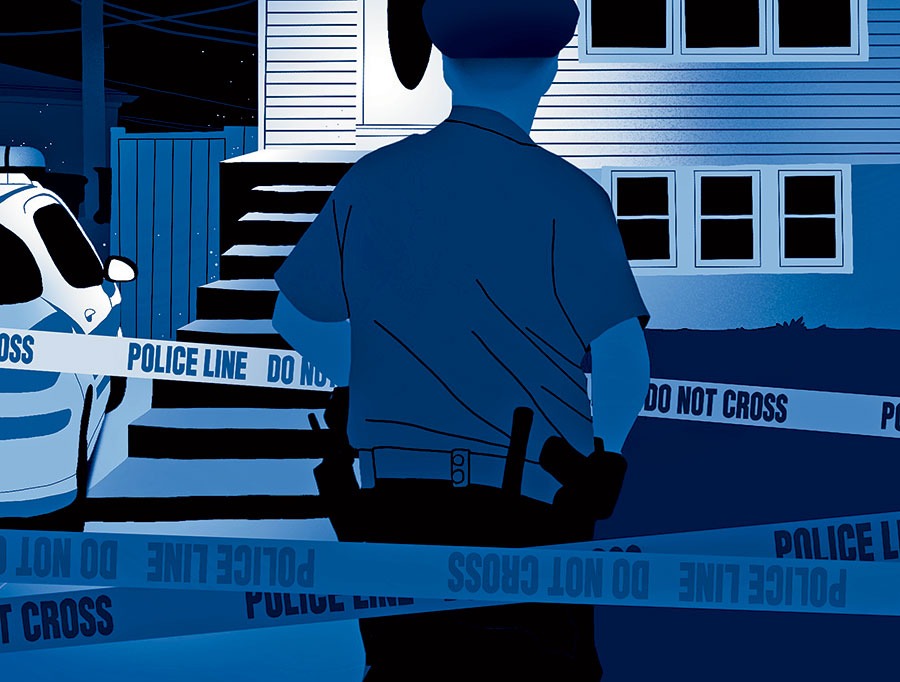
The corollary of the rule that crime goes down in the rain and snow is that it goes way, way up in the heat. In the midst of one sticky city twilight, a pair of teenage Hispanic siblings, brother and sister, took relief on the front stoop of their building while their parents went to the grocery store. What caught their attention was a gangbanger on his bicycle, circling the streets adjacent to their block. The brother had recently visited a Marine Corps recruiter as part of making plans for after high school graduation, and his little sister was an honor student. She told me they were discussing whether or not to stay outside when the biker shouted his set and pulled his burner gun from his waistband.
A burst of shots rang out in quick succession, aimed at someone who had been walking on the sidewalk on the opposite side of the street. The siblings ran inside for cover. They could see through the window as the target ran for his life, dashing down the path between their house and the one next door. The shooter biked off in the other direction, possibly to circle around and try again.
The siblings shut the windows and turned off the lights, staying low and listening for clues to the developing situation. They estimated that it took about five minutes for the first police car to arrive, and around 10 for the rest of the cavalry. They watched as the dusk of evening grew darker, sharpening the contrast between the strobing squad blues and probing flashlight whites. People outside were speaking to the officers and pointing in the direction of the siblings’ building.
Soon a group of eight to 10 officers encircled their home, with three pounding on the front door with an intensity that achieved its intended effect of scaring the siblings into thinking it would be broken down. When the brother opened the door, the sister was within two feet of him. That’s why she had an unobstructed view when, as she described it to me, the lead officer threw a packet of cocaine at her brother’s feet and used it as a pretext to drag him outside and order the other officers to search the house.
I saw the pictures of the ransacked place. The intensity of the violation of that sanctity and privacy is difficult to describe; police enter wherever they want, take whatever they want, break whatever they want, disrupt the order of everything personal and intimate. They found no bullets or casings, no gun, no gang insignia, no gunshot residue on the siblings’ hands, no bicycle, and no additional cocaine or drug paraphernalia — except for a small amount of weed in the brother’s sock drawer.
They took him in on possession charges for both the coke and the weed, which would be a very effective way to undercut his ability to file any complaints about the search and arrest. They were not kind to the sister, either, keeping her cuffed and surrounded for the duration of the search, threatening her with various charges of her own, and refusing to tell her where they were taking her brother.
In order to believe the charges brought against the young man, you have to believe that he witnessed a shooting and some 10 minutes of intense police activity right outside his window, and when a significant force of officers ordered him to open up, he decided to bring the only felony-level contraband in the house with him and then drop the drugs at his own feet.
On the client’s first court date, the prosecutor offered him enrollment in the state’s attorney’s drug school as punishment. It’s a program about the dangers of controlled substances, and upon the successful completion of it, the charges get dropped and the defendant keeps his record clean. The catch is that the defendant has to sign a stipulated agreement that there is enough evidence to convict him if the case were to proceed to trial.
Initially, I told the assistant state’s attorney that I would advise my client not to sign it since this case brought by the state was so egregious that it needed to be aired through testimony. The prosecutor was furious with me, snarling in a way I saw only a handful of times in my career. I talked it over with my client. If we took it to trial, we would be giving up a guaranteed win in the form of a clean record. It was too big of a risk — and a case in point that we needed to seek the best result, not the noble fight. I had to go back to the assistant state’s attorney and beg for the school diversion offer.
I’ve stood next to clients as they were sentenced to decades in prison and their lives were effectively ruined. I assisted with cases where defendants faced the death penalty. But I never saw anyone more emotionally traumatized than the sister was; the breathless way she tried to describe what the police had done to her and her brother through her choking tears, stinted speech, agonal gasps, and trembling convulsions is something that will stay with me for the rest of my days.
There is no way to measure what it feels like to be incarcerated until you get a taste of it for yourself. My taste came professionally. I was conducting a client visit in one of the maximum-security divisions at the Cook County Jail. At that time, Division 11 did not have a dedicated place for attorney visits. The deputies had to bring you onto the actual tier of cells to meet your client.
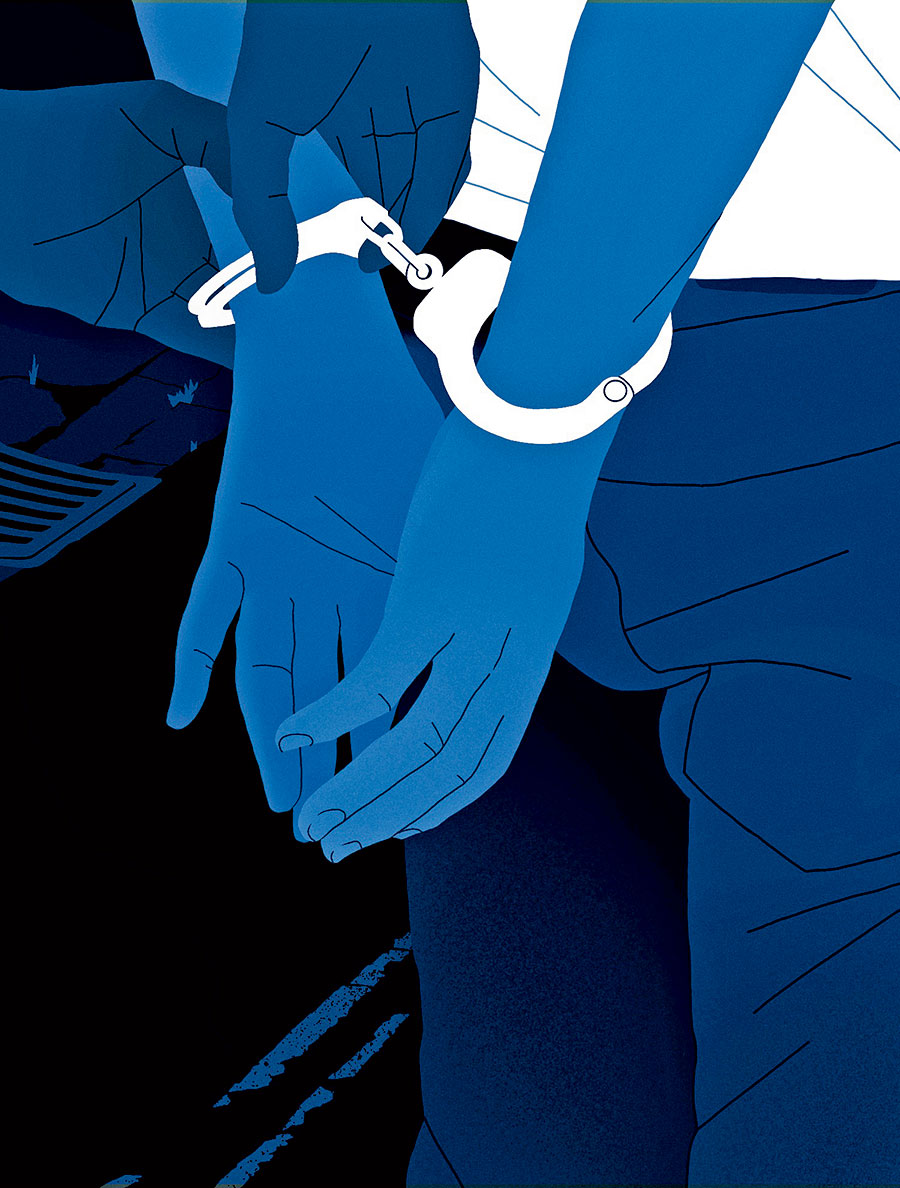
That division had a wheel-and-spoke layout, so after an elevator ride to your floor, you’d walk down a long hallway to the heavy steel sally-port doors that were gateways to the outer rings of the cellblocks. Just inside the entry was another long hallway. On one side was an indoor recreation room with a few basketball hoops, on the other were one or two small meeting rooms. Those were used for the attorney-client conferences. About 90 feet down the hallway was an elevated security desk, from which the deputies could see the sally port, the rec room, the cellblocks, and the doors to the meeting rooms.
Each meeting room was the same on every floor: cinder-block monochrome-white chambers with a thick glass window to the hallway and the bare essentials of furniture in the form of tiny steel tables and welded steel stools. There was an intercom with a button to call the security desk. Once deputies brought your client to the room, you’d be locked in together and had to buzz up to the watch desk to be released. If the buzzer wasn’t working, which it usually wasn’t, you had to pound on the glass until somebody heard you.
That particular visit went well. I had new reports to show my client as we prepared for his trial. He was pleased I was making progress and just with having a visitor. When we finished, I alerted the tower and they buzzed us out into the hallway. We closed the door behind us and, as instructed, waited for our escorts. The deputies shouted for my client to walk back up to the tier and told me to wait a minute so they could call someone from the main desk to bring me out.
Standing in the hallway waiting, I heard the distinct electric buzzer of another gate being opened, followed by a loud metallic click. It was rec time for one of the tiers, and I was standing at the entrance to the basketball court when the final barrier between me and an entire deck of maximum-security inmates was unlocked. I was there alone, a young white guy in civilian clothes, cornered against two locked doors and cinder-block walls, with dozens of inmates coming straight toward me and no deputies in sight.
Fortunately, most of the inmates didn’t care about anything but the basketball court and the rec room. There were so many of them that the ones in the back couldn’t even see I was there. But some started jeering with excitement and encircling me. I was scanning for familiar faces, trying to find anyone I was representing who might recognize the value in preserving mutual respect and my health, but none were to be found.
None of the inmates were physically rough with me, unless you count the proximity of their intimidation. What I endured was a steady stream of verbal jousting with a select group of inmates in a pack dynamic and a highly volatile environment. They enjoyed my discomfort.
I took some comfort in the cameras, but I could see that the security desk was unattended while head counts were being done or whatever issues had taken the attention of guards. I remembered a lesson that one of my friends in the sheriff’s office told me about his training in the police academy for situations where you find yourself without your partner, badge, gun, or radio: Even without any tools or any backup, you always have your authority.
My strategy was to maintain my composure by asking about their cases, their PDs, their judges, and sympathizing as much as possible with their plights and offering tokens of advice. I occasionally mentioned that the intercom was on and that the cameras could bring the SORT officers (Special Operations Response Team — the deputies the inmates truly feared), but none of us knew if that was true or not. A few of the inmates seemed to have endless energy to engage.
It took the deputies almost 45 minutes to remember I was there and come and get me. It felt like forever. But it was not even one full hour, let alone a day, or a week, or a month, or a year.
Adapted with permission from Everyone Against Us: Public Defenders and the Making of American Justice by Allen Goodman, published by the University of Chicago Press. © 2023 by the University of Chicago. All rights reserved.



